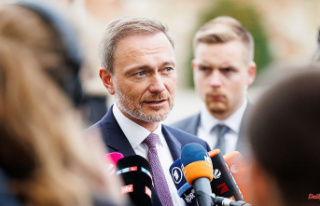The gas price brake should help industrial companies as early as January, but according to current plans it will only take effect for citizens at the end of the heating season. The prime ministers are calling for improvements. The federal ministers responsible, Habeck and Lindner, are open and yet covered.
The Prime Ministers' Conference (MPK) has called on the federal government to prevent gas prices from rising in January and February as proposed by the Gas Price Commission. Just like the other heads of state, he could "only urgently" advise against sticking to the procedure for the gas price brake proposed by the experts, said MPK chairman and Prime Minister of Lower Saxony Stephan Weil in Hanover.
The plans of the commission of experts envisage relief in December, higher prices in January and February and relief for citizens from March. The SPD politician said that such an approach would be "extremely difficult" to communicate with the citizens. As a possible alternative, Weil mentioned a voluntary suspension of price increases for January and February by the energy companies.
The MPK Vice President and North Rhine-Westphalian Prime Minister Hendrik Wüst also called for a departure from the Commission's proposal for the timetable for the gas price brake. "She has to come earlier," said the CDU politician at the joint press conference with Weil. It would be "much better" if this were to take effect as early as January.
The commission of experts set up by the federal government had proposed a one-off payment in December for private gas customers and small companies based on the advance payment in September. The actual price brake should come in January for industrial companies and for private households and small companies from March if possible, or April at the latest.
According to the Prime Minister, municipal and social institutions should also benefit from the relief provided by the announced gas price brake. That became clear during the consultations with representatives of the federal government, according to Wüst. According to Wüst, the rising energy prices also affect people who heat with oil and wood pellets. These citizens should also be relieved.
Finance Minister Christian Lindner and Economics Minister Robert Habeck presented the federal government's plans for a gas price brake to the state heads of government at the MPK. Habeck said on the sidelines of the conference that they had also discussed whether further support could come in January and February after a down payment in December, before the actual brake should then take hold in March.
"If there are any calculations that question the work of the commission, then we'll deal with them again," said the Green politician. "First of all, the announcement from the federal government is: we will implement the proposals of the commission."
Lindner said: "We are working at high speed to ensure that people and companies will see something with gas this year, and that we can also send an assurance to our country at the beginning of next year that the state cushions the financial burdens in this time of crisis."
The prime ministers also exchanged views with the federal government on a number of unresolved issues, such as financing the accommodation of refugees or local public transport, but no decisions were made here either. Weil said there is currently a decision backlog. This must be resolved on November 2 during the upcoming MPK talks with Chancellor Olaf Scholz.












